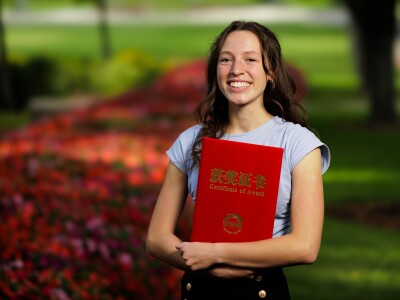How student mentoring led to the discovery and the designation
Not many people would ever say the words, “I’m super honored that you named this worm after me,” and mean it. Then again, not many people are BYU biology professor Byron Adams.
He really is wriggling with delight that an insect-killing nematode now carries his name. Adams loves all nematodes, the microscopic roundworms that live everywhere on Earth and are tiny enough you could fit six of them across the width of a human hair. They’re some of the oldest animals on Earth, and they are also the most abundant animal on the planet.
Some 20 years ago, Adams became fascinated with the creatures and decided he wanted to study them for the rest of his career. But Adams isn’t crazy; he’s brilliant. Nematodes are extremely diverse and resilient little squirmies and can survive just about any conditions. This makes them a particularly useful animal for studying how climate change affects biological diversity, and coincidentally, leads to a lot of field work in places like Nunavut and Antarctica.
As he’s inched along his academic trail, Adams has introduced many students to his love of nematodes and found ways to get as many of them as possible — more than 100 — to carry out field work collecting the worms and lab work analyzing and studying the creatures. One particular student, an undergraduate named Adler Dillman (class of 2006), learned to love nematodes too.
Which brings us to the point of this story: Dillman, now a full-time professor at the University of California, Riverside, has discovered a brand-new species of nematode, and he’s decided to name it after his BYU mentor, Byron J. Adams.
Dillman’s honoring of Adams is a clear manifestation of the impact professors at BYU have on undergraduate students as they provide them with experiential learning opportunities and mentor them in the lab and in the field. In fact, Dillman says the mentoring Adams offered him changed the entire trajectory of his career. And now he’s adopted the same approach of including students in the work at his own lab at UC-Riverside.
“If there’s somebody who loves nematodes more than Byron, I haven’t met them yet,” said Dillman, who is also the chair of the Department of Nematology within the Center for Infectious Disease and Vector Research at UC-Riverside. “It was fitting that it would be named after him.”
So, meet the newest nematode to be discovered on Earth: Steinernema adamsi. It’s not cute or cuddly, but it’s part of a special group of nematodes considered beneficial to humans because it can infect and kill insect pests (fleas/gnats/grubs/weevils). Steinernema adamsi is an entomopathogenic nematode that crawls inside of an insect, defecates highly pathogenic bacteria into its blood and then combines with that bacteria to kill the insect host.
It sounds pretty gross, but it’s an important and useful function, and people can actually buy these types of nematodes on Amazon or at Home Depot for pest control. “Apply with watering can, pump sprayer, hose end sprayer or Nema-jet sprayer,” say the instructions on one listing for beneficial nematodes. “Enough for all your indoor plants or a couple of raised beds.” Only $36.99 for 5 million of the worms. You can get 100 million for $104.99.
Dillman discovered the newest Steinernema nematode during field research in Thailand. He doesn’t yet know its specific insect hosts, but believes the discovery adds another insect-killing nematode that can be useful and teach us new and interesting biology. BYU’s Adams couldn’t be more pleased. And honored.

“You could name it after anything in the world, and you want to name it after me? That’s an incredible honor,” Adams said. “What’s cool about this animal is that it has an incredible ability to sniff out, detect and find insects that live in the soil and then kill those insects very rapidly. It has great potential as a biological control organism for pest insects.”
Dillman’s honoring of Adams is a clear manifestation of the impact professors at BYU have on undergraduate students as they provide them with experiential learning opportunities and mentor them in the lab and in the field. In fact, Dillman says the mentoring Adams offered him changed the entire trajectory of his career. And now he’s adopted the same approach of including students in the work at his own lab at UC-Riverside.
“I love seeing my former students on all of these other campuses everywhere else where they can be a force for good in students’ lives,” Adams said. “Adler is an ambassador of the BYU way, everywhere he goes.”



